LIFE Green Heart - EN
In 2019, Toulouse Métropole was selected by the European Commission in the framework of the LIFE programme for the Environment and Climate action. The chosen project, based on experimentation and scientific partnerships, aims at revegetating the north part of the Ramier Island. More generally speaking, the LIFE GREEN HEART (Generate REsiliENt actions against the HEat islAnd effect on uRban Territories) project will create a new green lung on the Ramier island, as part of the Grand Parc Garonne project.
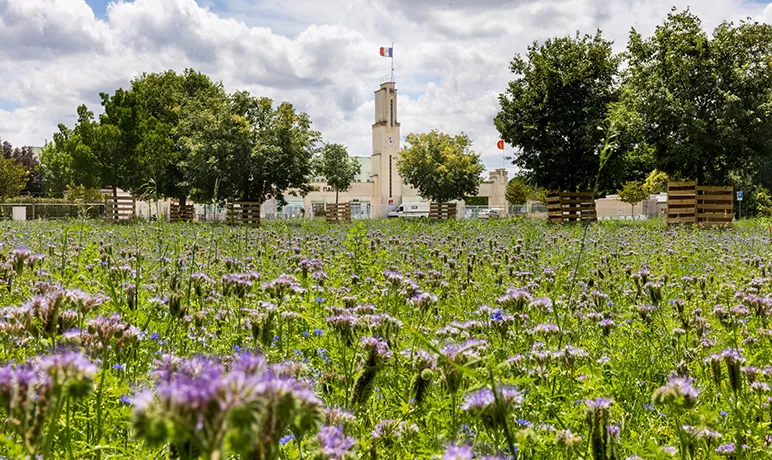
Context
A green island to develop the biodiversity and to fight against global warming and to ensure a biodiversity-friendly environment
Climate models are foreseeing a rise of 4°C in Toulouse by the end of the century. The deconstruction and relocation of the Exhibition Center (Parc des Expositions) built between 1952 and 1990, will allow to rebuild a green heart in the core of the city.
Project duration : 5 years (1st September 2019 – 1st September 2024)
Issues
A project selected by the E.U. for its innovative characteristics
LIFE Green Heart project brings a scientific value to the development plan of the Ramier island. The impoverished soils will be restored and fertilized with ecological innovative methods. This will be implemented in coherence with the choice of vegetal species adapted to the local ecosystem.
This transition will be monitored with the simultaneous measures of biodiversity, temperatures, pollutions and social perceptions evolutions.
The impacts of the project will exceed the strict perimeter of the island. It will increase the knowledge of the regreening actions upon the heat island urban effect.
Objectives
-
Lower local temperature by 3°C over 30ha and bring cooling in the nearby districts
-
Create 10 ha of green areas and reinforce the riverside vegetation by 2025
-
Restore biodiversity by consolidating the ecological corridors (green and blue)
-
Reduce air and noise pollution by developing 5km of soft mobility routes, within a circular economy process (-15% greenhouse gas emissions, -25% fine particles emissions)
-
Design long-term tools for the adaptation to climate change in Toulouse city
-
4.7t/ha/year of carbon capture instead of 0.5t/ha/year today
Perimeter
LIFE Green Heart's perimeter today
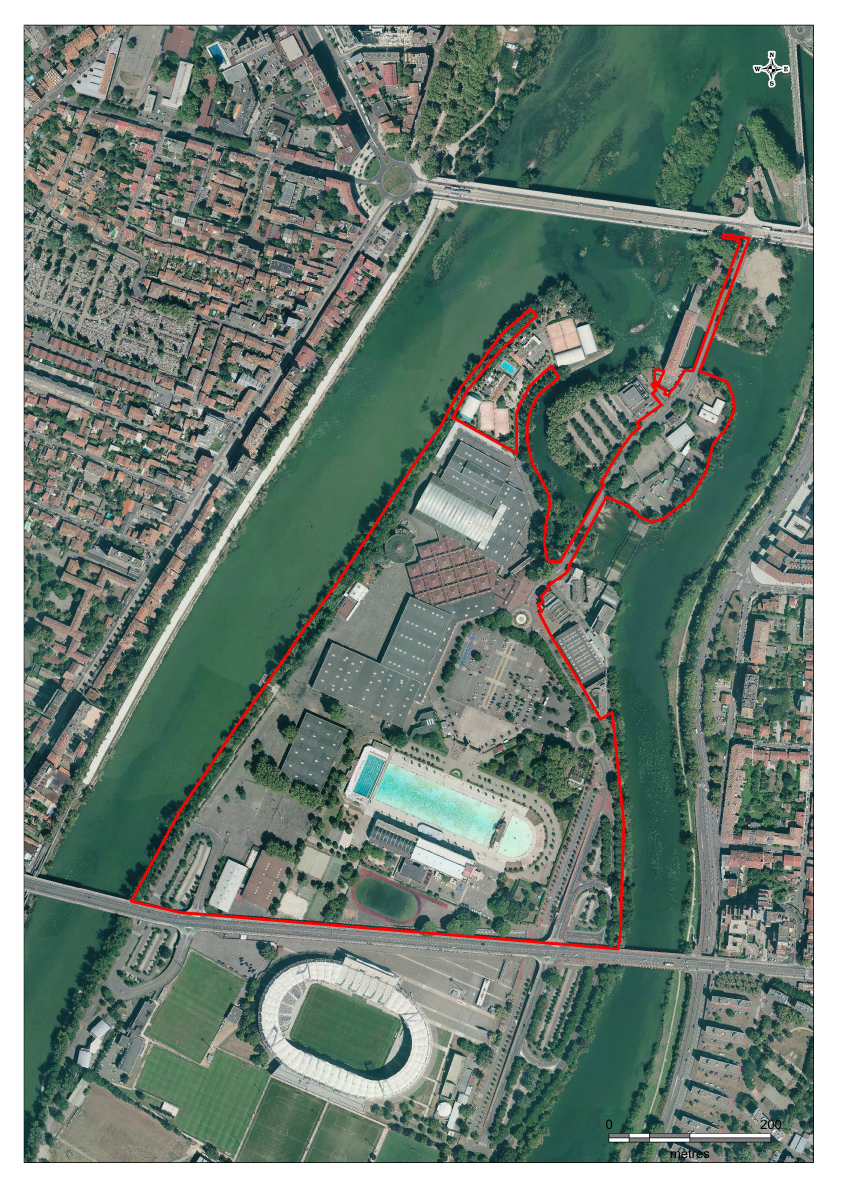
LIFE Green Heart's perimeter tomorrow
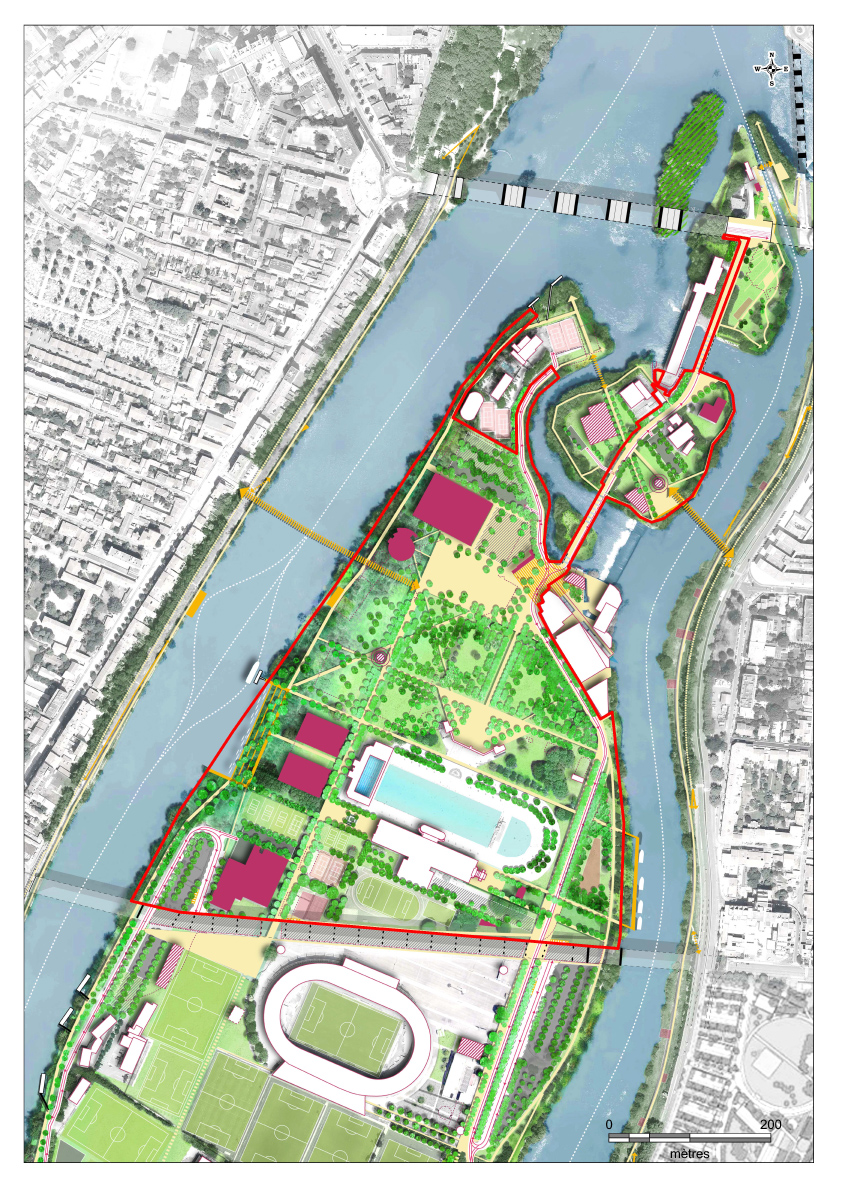
The results of the project
Schedule
- February - July 2020 : Preparation of the detailed first draft of the park
-
Spring 2020 - Summer 2021 :
- Implementation of the climate sensors
- Implementation of quality monitoring sensors on the Ramier island and around the city center -
July 2020 - Summer 2021 : Deconstruction of the Exhibition Center
-
2021 : Ecological restoration of the soils
-
Autumn 2022 : Launching of the first plantations
-
2025 : Delivery of the park
Funding
Total budget : 3 852 000 €
in which 3 175 356 € from Toulouse Métropole Project co-financed by the European Union for 55% of expenses, being a grant amount of 2 107 600€
Partners
A project implemented in partnership with scientific actors

The Natural History Muséum brings its expertise on the evolution of biodiversity that results from the regreening. To do so, professional naturalists are monitoring the biodiversity such as birds, insects, amphibians, reptiles, terrestrial mammals, chiropterans) as well as the flora of the island.
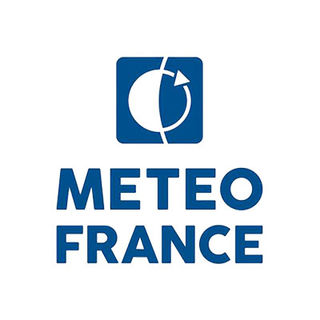
The Meteorological Research National Center is accompanying the project in monitoring local and neighboring temperature. 16 new monitoring stations are being set up on the island, the Garonne riverside, and in the neighborhood.

WaltR is a Startup born in 2018 specialized in air quality modelling and monitoring. As part of the LIFE project, it is working on the impacts of the project on air quality evolution on the spot, as well on the whole city of Toulouse. To do so, WaltR set up 5 new measuring stations on the spot, and 5 ultraviolet and infrared cameras in the surroundings of the city center.

The University of Caen Normandie is analyzing the social and economic impacts of the project. This study is focusing on the perceptions of mobility, health, outdoors activities, environment and climate change.

Dusseldorrf city, twinned with Toulouse, is partner of the project. The size and morphology of the two cities are comparable. Dussedorf is active in the field of urban climate and therefore, very interested in this project. This city also shares its skills in waste material reutilization with Toulouse.
Networking
Active exchange
- Life Lungs
Coordination : Lisbon City Council
implement nature based solutions to enable Lisbon´s urban green infrastructure to adapt to climate change events. - LIFE CLIVUT
(Portugal) - Coordination : Università degli Studi di Perugia
improve urban ecosystem adaptation capacity, maximize urban green asset climate mitigation potential and improve human safety, health and wellbeing in 4 medium-size Mediterranean cities. - LIFE-CLIMCOOP
Hungary, Université of Miskolc
1st Sept. – 31st August 2024
Cooperation of cities and local companies for climate change adaptation - LIFE DICCA
City of Vienna
The EU project LIFE DICCA will run for five years and aims to implement targeted measures to counteract the negative impacts of climate change. The acronym "DICCA" stands for "Danube Island Climate Change Adaptation".
Other similar european projects
- LIFE Urban Adapt LIFE14 CCA/NL/000302 (Netherland): demonstration of innovative and sustainable projects that strive to combat climate change in several sites of the city.
- LIFE Nature4city - LIFE16 GIC/FR/000099 (France) : develop nature in cities to enhance the attractiveness of urban areas and adapt to climate change.
- LIFE intégré ARTISAN LIFE/IP/20/251 (France) : increase the Resilience of Territories to climate change through the Incentive for Nature-based Adaptation Solutions for local authorities.
- LIFE Air Fresh LIFE19 ENV/FR/00086 (France) : air pollution removal by urban forests for a better human well being
- LIFE intégré IP Smart Waste LIFE16 IPE/FR/000005 (France) : developing the territorial dynamics to implement and reinforcing the efficiency of the most recent departmental plans (2014-2016), as a first step, then the Regional Plan for Prevention and Management of Waste.
- Horizon2020 Urban Green Up (Several European cities) : developing, applying and validating a methodology for Renaturing Urban Plans to mitigate the effects of climate change, improve air quality and water management and increase the sustainability of our cities through innovative nature-based solutions.
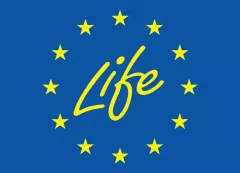
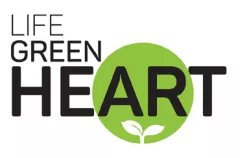
Date de mise à jour :
